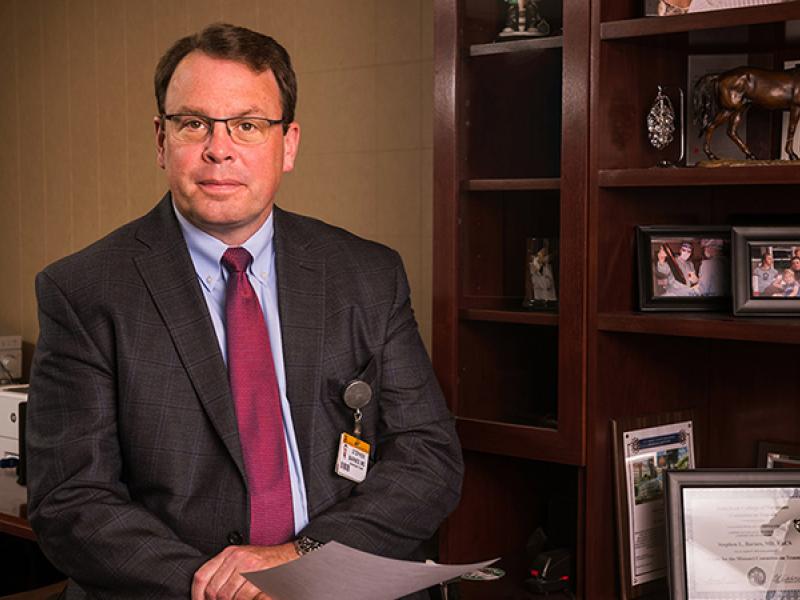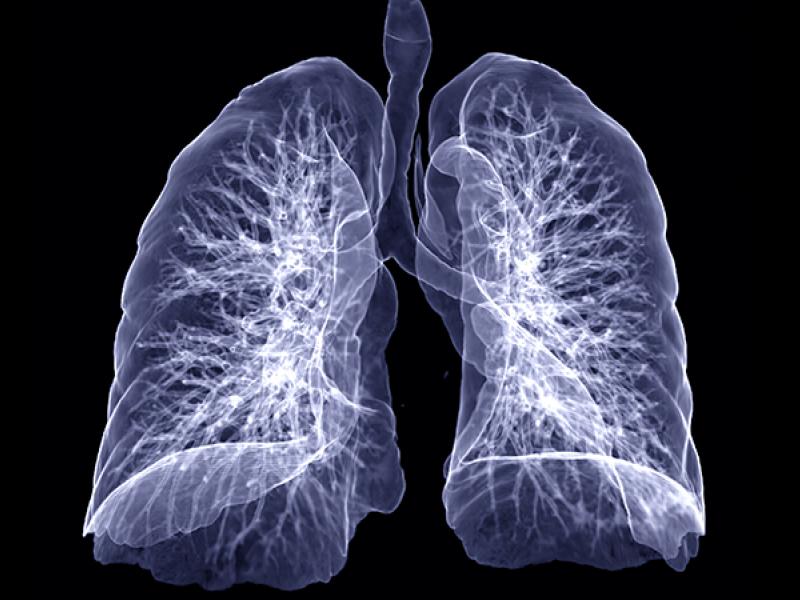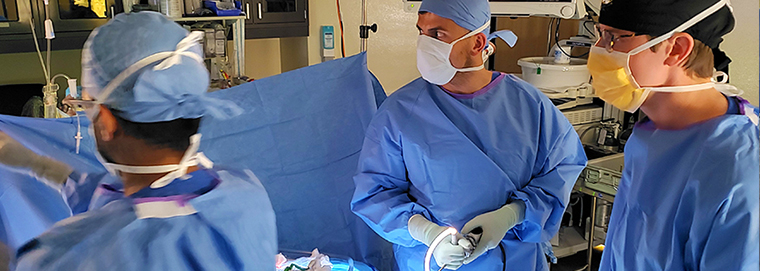
Confident. Competent. Capable.
Our goal is develop surgeons who are equipped with knowledge and expertise to excel in their chosen field. Our residents are well-prepared for entering private practice or obtaining a fellowship upon graduation. Mizzou’s surgical faculty are focused on education and use every situation to provide a learning opportunity. We foster an environment of inquiry by employing a wide variety of engagement. The Socratic method of frequent and insightful questioning is popularly used to engage learners into meaningful discussions that results in academic growth. To facilitate progressive learning, we offer a comprehensive curriculum to guide young hands and minds as they attain the title of “surgeon.”
To provide a framework of scheduled topics, we utilize SCORE from the American College of Surgeons. SCORE is a compilation of texts, journal articles and other information to guide resident training. Each week, we augment the SCORE curriculum with a variety of educational opportunities to advance resident learning.
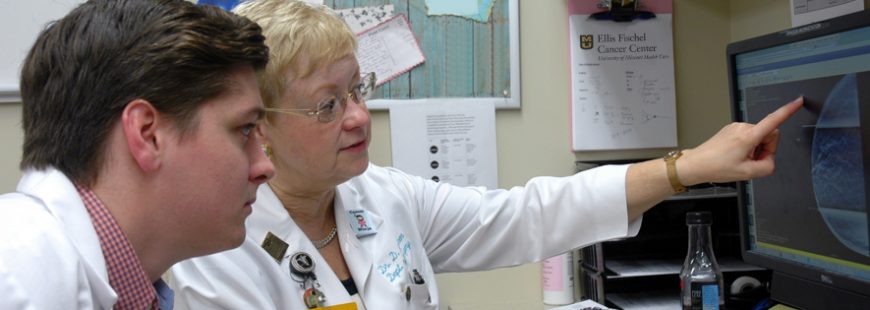
Didactics
Basic Science Conferences
Surgical topics from SCORE are discussed in a lecture format two to three times each month. Residents participate actively in presenting key surgical themes, along with faculty. Peer-to-peer education is highly valued and offers benefits of increased knowledge, improved presentation skills and greater interaction.
Journal Club
We utilize surgical questions to drive journal club discussions. Residents compete as groups through presentations of peer-chosen manuscripts to determine the best answer to a clinical question. The presentations are evaluated for their evidence-based approach to solving clinical problems.
Morbidity and Mortality
Residents present cases each week and provide literature support for their recommendations. Thoughtful and insightful discussions can be expected. This has historically been a favorite conference for residents as they prepare for the ABS Certifying Examination.
ABSITE Review
The annual ABSITE exam is an important precursor to the ABS Qualifying Examination and is an important part of growing surgical knowledge. Several ABSITE reviews are held in December and January to help resident surgeons gain insight into areas for improvement as they prepare for the examination.
Grand Rounds
Speakers from around the world are invited by the Department of Surgery to give lectures on a variety of topics. Grand Rounds are held on a monthly basis and are an educational feast for our residents.
Service Specific Educational Opportunities
Each service has its own, individually-directed educational opportunities for residents. All are welcome to attend any of the many conferences held throughout each week:
- Acute Care Surgery – Twice weekly conferences
- Cardiothoracic – Divisional M&M, Case conference, CT Journal Club
- Pediatric Surgery – Twice monthly conferences
- Surgical Critical Care – Weekly conference
- Surgical Oncology – Weekly Tumor Board and Breast Conference
- Vascular – Twice weekly conferences
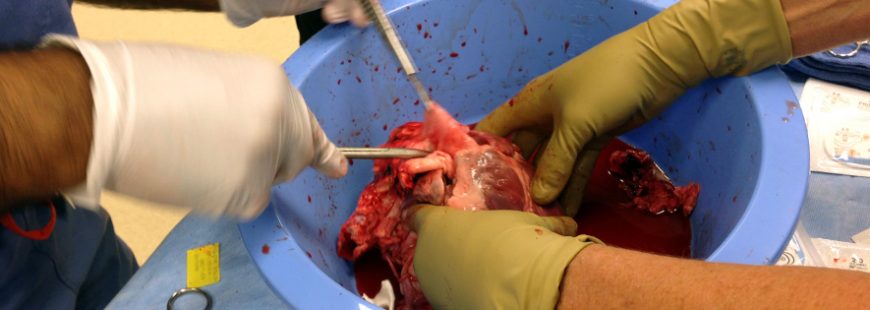
Simulation
Surgical simulation continues to grow and Mizzou has been at the forefront of these efforts. With funded faculty dedicated to improving surgical education, our simulation curriculum is leading-edge. Monthly simulation courses are held for PGY 1-3 residents that encompass a variety of surgical topics including laparoscopic skills, FLS training, hernia, foregut, hepatobiliary, vascular, trauma and thoracic.
Employing the state-of-the-art Sheldon Clinical Simulation Center, we utilize a number of methods to augment surgical training including high-fidelity simulation, laparoscopic and open tissue training, and benchtop low fidelity methods of simulation. Senior residents participate in biannual aggressive trauma surgical skills simulations that replicate the fast pace and high stress of the multisystem environment. These simulations are a favorite of our residents.
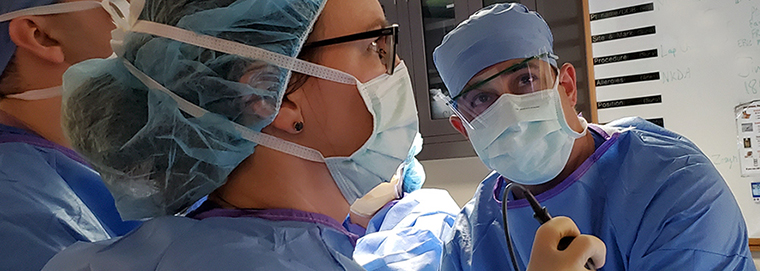
Clinical Rotations
Our rotation schedule is designed to enable residents graduated responsibility throughout their training while being exposed to a variety of surgical subspecialties. We foster growth of surgical skills by expecting an early entry into the operating theatre. All residents are expected to participate in operations from the first day of residency. Our rotations are divided into 4-week blocks. Our goal is to provide a uniform experience over the course of training to ensure our graduates are prepared to operate independently as consummate surgeons. Our typical schedule is below.
PGY 1
Acute Care Surgery – 2 blocks
General Surgery – 1-2 blocks
Surgical Oncology – 1-2 blocks
VA General & Vascular Surgery – 3-4 blocks
Night Float – 2 blocks
Pediatric Surgery – 1 block
Cardiothoracic Surgery – 1 block
Burn – 1 block
Vascular Surgery – 1-2 blocks
PGY 2
Acute Care Surgery – 2 blocks
General Surgery – 2-3 blocks
Surgical Oncology – 1 block
VA General & Vascular Surgery – 2 blocks
Night Float – 2 blocks
Pediatric Surgery – 1-2 blocks
Surgical Critical Care – 2 blocks
PGY 3
Acute Care Surgery – 2 blocks
General Surgery – 2 blocks
Surgical Oncology – 2 blocks
VA General & Vascular Surgery – 1 blocks
Night Float – 2 blocks
Head & Neck Surgery – 1 block
Endoscopy – 1 block
Thoracic Surgery – 1 block
Vascular Surgery – 1 block
PGY 4
Acute Care Surgery – 2 blocks
General Surgery – 1 block
Surgical Oncology – 1-2 blocks
VA General & Vascular Surgery – 1-2 blocks
Night Float – 2 blocks
Pediatric Surgery – 1 block
Cardiothoracic Surgery – 2 blocks
Vascular Surgery – 1-2 blocks
Off-site Private Practice Rotation – 1 block
PGY 5
Acute Care Surgery – 2 blocks
General Surgery – 3-4 blocks
Surgical Oncology – 2-3 blocks
VA General & Vascular Surgery – 3 blocks
Night Float – 2-3 blocks
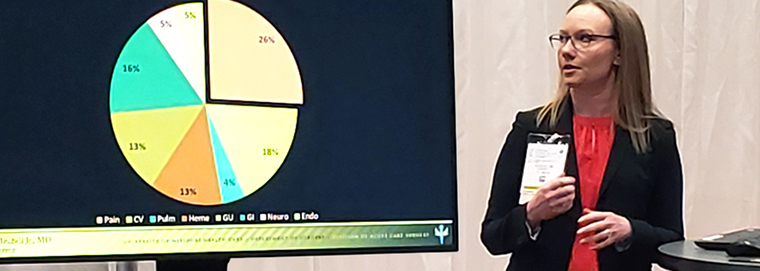
Research
Our faculty are dedicated to advancing the care of surgical patients by training tomorrow’s surgeons and through rigorous study and research. Funded faculty operate in each division of the Department of Surgery and multiple opportunities for research abound within the training program. More than 75 active investigational projects are currently underway including tumor immunology, surgical oncology, vascular surgery, trauma and acute care surgery, surgical education and surgical technology.
Experienced researchers from around the globe conduct basic and clinical science research within the MU Department of Surgery. Campus, multi-institutional and multi-global collaborations exist to aid in the completion of complex and meaningful research contributions to the surgical and medical community at large. Resident participation is encouraged and opportunities exist for those who choose research as a significant portion of their career. Each resident is required at least one research project during their five years of training, although many pursue multiple opportunities.




